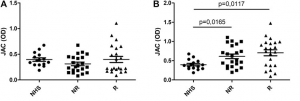A group from University of Pisa, Italy, etc. has reported a new biomarker for ulcerative colitis.
https://www.frontiersin.org/articles/10.3389/fphar.2021.654319/full/
Ulcerative colitis (UC) is a chronic relapsing disease, characterized by an inflammation affecting the colon and the rectum with superficial mucosal ulceration, rectal bleeding, diarrhea and abdominal pain. Tumor necrosis factor (TNF) plays an important role in UC pathogenesis. Indeed, several immune cells produce high levels of TNF, and this cytokine is known to mediate several pro-inflammatory functions in the inflamed mucosa, promoting even tissue injury. On this basis, the monoclonal antibodies anti-TNF, like infliximab (IFX) and adalimumab (ADA), were developed for treatment of UC.
However, more than 30% of the UC patients receiving anti-TNF agents do not respond to treatment. Therefore, developing an early prediction method of therapeutic outcome is one of the most important challenges to optimize therapeutic management.
Authors has shown that Jacalin(JAC)-specific IgG glycosylation could be used as a biomarker of disease activity in UC, especially before starting an anti-TNF therapy. JAC is an O-glycan binder, and the putative role of JAC in predicting therapeutic effectiveness from the O-glycan point of view was not clearly demonstrated here, but it could be used as a good biomarker predicting therapeutic responses.
Many autoimmune diseases are associated with qualitative perturbations in circulating antibodies, and agalactosylated IgG is considered a marker of inflammatory condition. Agalactosylated IgG is capable to interact with FcγRIIa, induce macrophage activation and, subsequently, induce pro-inflammatory cytokines such as production of TNFα and IL6. Several studies showed that agalactosylation could be reverted in therapeutic conditions capable of ameliorating the inflammatory diseases. It has been known that in rheumatoid arthritis, steroid and anti-TNF therapy induce changes in IgG glycosylation from agalacto to sialo-complex-types.

